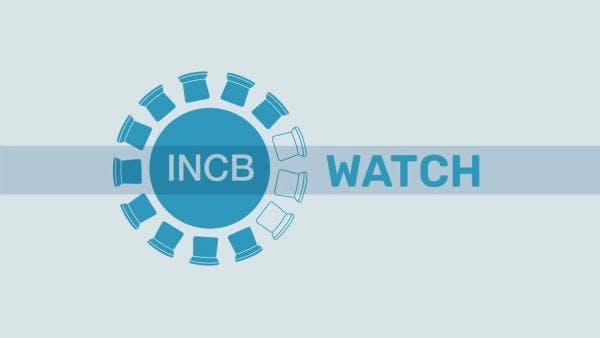Stickpen - Public domain
INCB highlights dearth of access to controlled medicines as ‘pressing public health problem’
The inequities caused by drug control are made sharply apparent by the enduring global epidemic of pain caused by the lack of availability of controlled substances for scientific and medical purposes. Morphine offers a critical example. Despite its fundamental role in pain management and sedation, it is estimated that ¾ of the world have little to no access to this essential medicine.
With this in mind, it is commendable that the INCB continued to advocate for improved access to [at least some] controlled medicines over the last quarter of 2019. Activities in this direction included a regional training seminar held in Moscow for drug control officials from various Russian-speaking countries, and the INCB’s 126th session during which the Board’s Standing Committee on Estimates met to review national requirements for internationally controlled drugs, in an effort to ensure availability for medical and scientific purposes. At the session, the INCB President noted that:
‘The lack of availability of narcotic drugs and psychotropic substances for legitimate medical use represents a pressing public health problem in many regions of the world that countries must address without further delay’.
This issue was further highlighted in the INCB President’s statement for World Mental Health Day, in which he concluded that ‘Addressing the lack of availability of internationally controlled substances, particularly in middle and low-income countries, is essential in order to alleviate the suffering of people, as well as help to prevent suicide’.
As the evidence-base for the therapeutic potential of psychedelic substances continues to grow, we can only hope that the INCB will also acknowledge the obstacles that prohibition has imposed on clinical research concerning mental health.
The INCB also intervened at the first series of thematic CND discussions on the implementation of the 2019 Ministerial Declaration. On 16th October, the INCB raised both political and practical impediments to ensuring adequate access to controlled medicines, while preventing their diversion for non-medical use. Positively, the INCB’s closing remarks also tackled the issue of human rights:
‘I wish to reiterate yet again that if drug control measures adopted by States violate internationally recognised human rights standards and norms, they also violate the international drug control conventions. No crimes should be committed in the name of drug control’.
Going further in his statement delivered at the Reconvened 62nd Session of the CND in December, the INCB urged for:
‘…the immediate cessation of extrajudicial actions against suspected drug-related behaviour, and again call on countries that maintain capital punishment for drug-related offences to consider its abolition’.
Finally, from 7th to 9th October 2019, the INCB conducted a visit to Jordan, the only recorded country mission conducted during Q4 2019.
Related Profiles
- International Narcotics Control Board (INCB)
